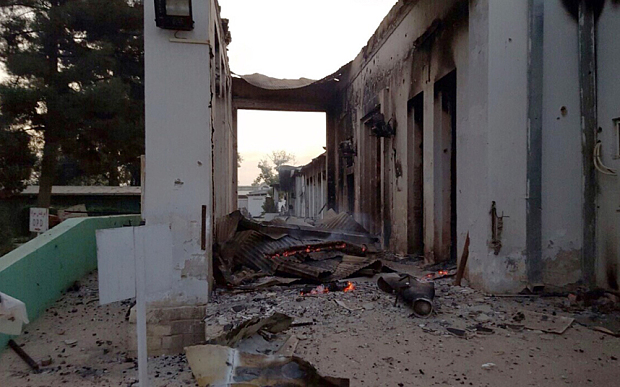Doctors Without Borders/Médecins Sans Frontières (MSF) nurse Lajos Zoltan Jecs was in Kunduz trauma hospital when the facility was struck by a series of aerial bombing raids in the early hours of Saturday morning. He describes his experience:
“It was absolutely terrifying.
I was sleeping in our safe room in the hospital. At around 2am, I was woken up by the sound of a big explosion nearby. At first I didn't know what was going on. Over the past week we'd heard bombings and explosions before, but always further away. This one was different, close and loud.
At first there was confusion, and dust settling. As we were trying to work out what was happening, there was more bombing.
'The bombs hit and then we heard the plane circle round. There was a pause, and then more bombs hit. This happened again and again. When I made it out from the office, the main hospital building was engulfed in flames. Those people that could had moved quickly to the building’s two bunkers to seek safety. But patients who were unable to escape burned to death as they lay in their beds.'
After 20 or 30 minutes, I heard someone calling my name. It was one of the Emergency Room nurses. He staggered in with massive trauma to his arm. He was covered in blood, with wounds all over his body.
At that point my brain just couldn't understand what was happening. For a second I was just stood still, shocked.
He was calling for help. In the safe room, we have a limited supply of basic medical essentials, but there was no morphine to stop his pain. We did what we could.
I don't know exactly how long, but it was maybe half an hour afterwards that they stopped bombing. I went out with the project coordinator to see what had happened.
What we saw was the hospital destroyed, burning. I don’t know what I felt, just shock again.
We went to look for survivors. A few had already made it to one of the safe rooms. One by one, people started appearing, wounded, including some of our colleagues and caretakers of patients.
We tried to take a look into one of the burning buildings. I cannot describe what was inside. There are no words for how terrible it was. In the Intensive Care Unit six patients were burning in their beds.
We looked for some staff that were supposed to be in the operating theater. It was awful. A patient there on the operating table, dead, in the middle of the destruction. We couldn't find our staff. Thankfully we later found that they had run out from the operating theater and had found a safe place.
Just nearby, we had a look in the inpatient department. Luckily untouched by the bombing. We quickly checked that everyone was OK. And in a safe bunker next door, also everyone inside was OK.

Two doctors killed in the US airstrike on a MSF clinic in Kunduz, Afghanistan on Oct. 3, 2015. (Photo: Hambastagi.org)
And then back to the office. Full, patients, wounded, crying out, everywhere.
It was crazy. We had to organize a mass casualty plan in the office, seeing which doctors were alive and available to help. We did an urgent surgery for one of our doctors. Unfortunately he died there on the office table. We did our best, but it wasn't enough.
The whole situation was very hard. We saw our colleagues dying. Our pharmacist...I was just talking to him last night and planning the stocks, and then he died there in our office.
The first moments were just chaos. Enough staff had survived, so we could help all the wounded with treatable wounds. But there were too many that we couldn't help. Somehow, everything was very clear. We just treated the people that needed treatment, and didn't make decisions. How could we make decisions in that sort of fear and chaos?
Some of my colleagues were in too much shock, crying and crying. I tried to encourage some of the staff to help, to give them something to concentrate on, to take their minds off the horror. But some were just too shocked to do anything. Seeing adult men, your friends, crying uncontrollably—that is not easy.
I have been working here since May, and I have seen a lot of heavy medical situations. But it is a totally different story when they are your colleagues, your friends.
These are people who had been working hard for months, non-stop for the past week. They had not gone home, they had not seen their families, they had just been working in the hospital to help people... and now they are dead. These people are friends, close friends. I have no words to express this. It is unspeakable.
The hospital, it has been my workplace and home for several months. Yes, it is just a building. But it is so much more than that. It is healthcare for Kunduz. Now it is gone.
What is in my heart since this morning is that this is completely unacceptable. How can this happen? What is the benefit of this? Destroying a hospital and so many lives, for nothing. I cannot find words for this.”

Oct. 3, 2015: The aftermath of an airstrike carried out by the US on the MSF clinic in Kunduz, Afghanistan. (Photo: MSF)



